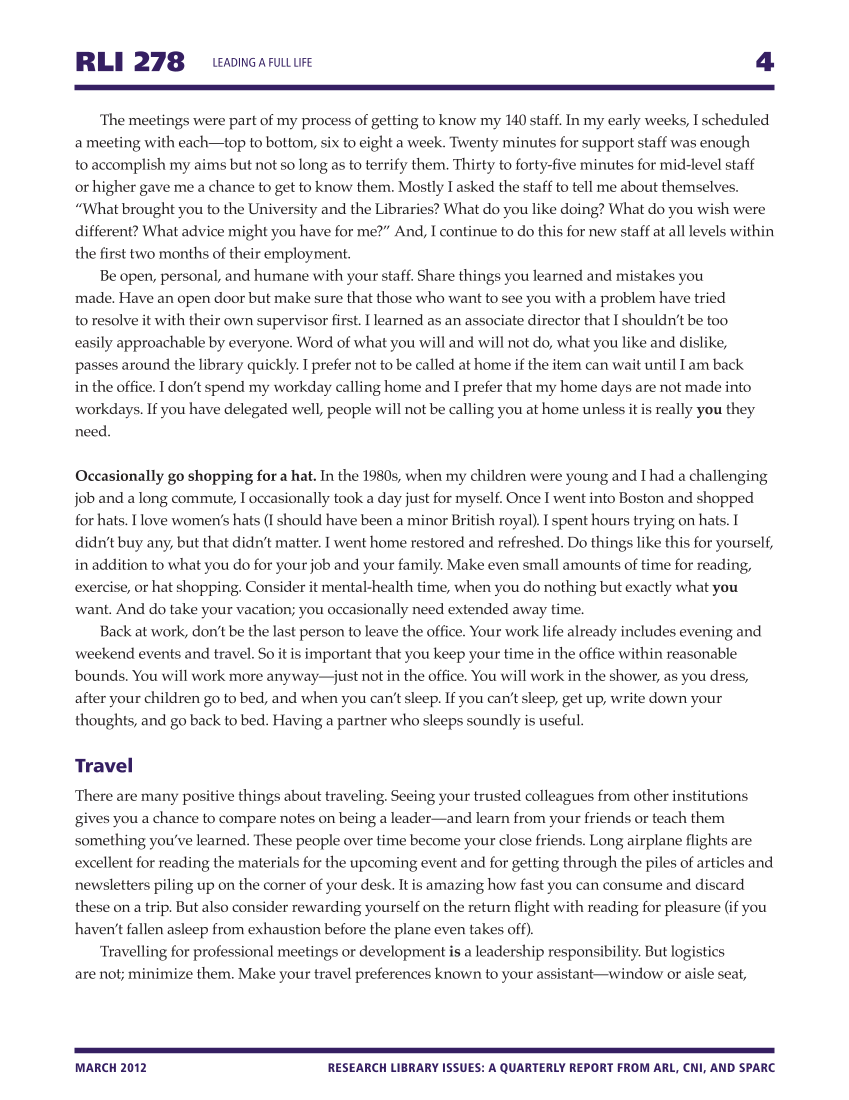RLI 278 4 March 2012R esearch Library Issues: A Quarterly Report from ARL, CNI, and SPARCarc Leading a Full Life The meetings were part of my process of getting to know my 140 staff. In my early weeks, I scheduled a meeting with each—top to bottom, six to eight a week. Twenty minutes for support staff was enough to accomplish my aims but not so long as to terrify them. Thirty to forty-five minutes for mid-level staff or higher gave me a chance to get to know them. Mostly I asked the staff to tell me about themselves. “What brought you to the University and the Libraries? What do you like doing? What do you wish were different? What advice might you have for me?” And, I continue to do this for new staff at all levels within the first two months of their employment. Be open, personal, and humane with your staff. Share things you learned and mistakes you made. Have an open door but make sure that those who want to see you with a problem have tried to resolve it with their own supervisor first. I learned as an associate director that I shouldn’t be too easily approachable by everyone. Word of what you will and will not do, what you like and dislike, passes around the library quickly. I prefer not to be called at home if the item can wait until I am back in the office. I don’t spend my workday calling home and I prefer that my home days are not made into workdays. If you have delegated well, people will not be calling you at home unless it is really you they need. Occasionally go shopping for a hat. In the 1980s, when my children were young and I had a challenging job and a long commute, I occasionally took a day just for myself. Once I went into Boston and shopped for hats. I love women’s hats (I should have been a minor British royal). I spent hours trying on hats. I didn’t buy any, but that didn’t matter. I went home restored and refreshed. Do things like this for yourself, in addition to what you do for your job and your family. Make even small amounts of time for reading, exercise, or hat shopping. Consider it mental-health time, when you do nothing but exactly what you want. And do take your vacation you occasionally need extended away time. Back at work, don’t be the last person to leave the office. Your work life already includes evening and weekend events and travel. So it is important that you keep your time in the office within reasonable bounds. You will work more anyway—just not in the office. You will work in the shower, as you dress, after your children go to bed, and when you can’t sleep. If you can’t sleep, get up, write down your thoughts, and go back to bed. Having a partner who sleeps soundly is useful. Travel There are many positive things about traveling. Seeing your trusted colleagues from other institutions gives you a chance to compare notes on being a leader—and learn from your friends or teach them something you’ve learned. These people over time become your close friends. Long airplane flights are excellent for reading the materials for the upcoming event and for getting through the piles of articles and newsletters piling up on the corner of your desk. It is amazing how fast you can consume and discard these on a trip. But also consider rewarding yourself on the return flight with reading for pleasure (if you haven’t fallen asleep from exhaustion before the plane even takes off). Travelling for professional meetings or development is a leadership responsibility. But logistics are not minimize them. Make your travel preferences known to your assistant—window or aisle seat,
























